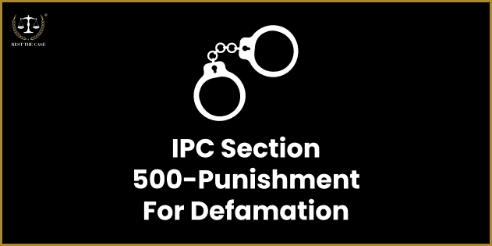Introduction
In a democratic society, the freedom of speech and expression is a fundamental right enshrined under Article 19(1)(a) of the Indian Constitution. However, this right is not absolute and is subject to reasonable restrictions. One such restriction pertains to defamation, a concept enshrined in Sections 499 and 500 of the Indian Penal Code (IPC), 1860. While Section 499 defines defamation, Section 500 IPC lays down the punishment for this offence. It serves as a legal mechanism to protect an individual’s reputation, which is considered an essential facet of the right to life under Article 21 of the Constitution.
Text of Section 500 IPC
“Punishment for defamation.—Whoever defames another shall be punished with simple imprisonment for a term which may extend to two years, or with fine, or with both.”
Meaning and Scope
Section 500 is the penal provision that criminalizes the act of defamation as defined under Section 499 IPC. It protects an individual’s reputation against false and malicious statements—whether spoken, written, or by signs and visual representation—that are likely to harm that person’s standing in the eyes of others.
To invoke Section 500 IPC, the following elements must be established:
- An imputation was made (either in words, writing, signs or gestures),
- It concerned a specific person or a well-defined group,
- The imputation was made with the intent to harm, or with knowledge or reason to believe that it would harm the reputation of such person.
Nature of the Offence
- Type: Bailable
- Cognizability: Non-cognizable
- Triable by: Magistrate of the first class
- Punishment: Simple imprisonment up to 2 years, or fine, or both
Section 500 IPC ensures a balance between individual dignity and freedom of speech. It is a quasi-civil remedy, as the complainant can also seek damages under civil law for defamation apart from pursuing a criminal case.
Reputation as a Legal Right
In Subramanian Swamy v. Union of India (2016), the Supreme Court held that the right to reputation is a part of Article 21 (Right to Life) of the Constitution. The court upheld the constitutional validity of Sections 499 and 500 IPC, stating that criminal defamation is a reasonable restriction on free speech in the interest of protecting the dignity and reputation of individuals.
Essentials of Punishable Defamation Under Section 500
To attract punishment under Section 500 IPC, the following must be established:
- Defamatory Imputation: The statement must lower the person’s moral or intellectual character, respect in the profession, or cast aspersions on personal integrity.
- Reference to a Person: The imputation must refer to a living person, identifiable by name, description, or context.
- Publication: There must be communication of the defamatory statement to someone other than the person defamed.
- Intention or Knowledge: The accused must have intended to harm or had reason to believe that the statement would harm the complainant’s reputation.
Examples of Defamation Under Section 500 IPC
- Publishing false news accusing a politician of embezzlement.
- Alleging in a public meeting that a teacher is a fraud without evidence.
- Circulating a defamatory meme targeting a specific business owner.
Exceptions Under Section 499 IPC (Relevant to Section 500)
There are 10 exceptions under Section 499 IPC that protect certain statements from being treated as defamatory. If any of these exceptions apply, Section 500 IPC cannot be invoked. Some key exceptions include:
- Truth for public good
- Fair criticism of public conduct of public servants
- Fair comment on public questions
- Reports of court proceedings
- Censure passed in good faith by someone in lawful authority
For instance, if a journalist reports a corruption case backed by evidence and in public interest, it may fall under the exceptions, negating criminal liability under Section 500.
Landmark Judgments
- Subramanian Swamy v. Union of India (2016) 7 SCC 221
The Supreme Court upheld the constitutionality of criminal defamation under Sections 499 and 500 IPC. It observed that reputation is an integral part of Article 21 and the criminal provision is a reasonable restriction on Article 19(1)(a). - Ram Jethmalani v. Subramanian Swamy (2006)
The court held that statements alleging a person’s involvement in a crime, without evidence, could amount to defamation and attract punishment under Section 500 IPC. - Mahendra Ram v. Harnandan Prasad (1958 AIR 941)
A letter written in Urdu, unreadable by the recipient but read by others, was held to be defamation due to third-party communication, establishing publication.
Procedure for Initiating Criminal Defamation
- A complaint must be filed before a Judicial Magistrate First Class under Section 200 CrPC.
- The complainant must support it with preliminary evidence and witness statements.
- If the court finds a prima facie case, process is issued under Section 204 CrPC.
- The accused is summoned to appear, and trial follows like any other summons case.
Criticism of Section 500 IPC
- Chilling Effect on Free Speech: Critics argue that criminal defamation suppresses dissent, especially against public officials and corporates.
- Used as a Tool of Harassment: The criminal process can be misused to stifle journalists and activists by dragging them into prolonged legal battles.
- Global Trends: Many democracies like the UK have abolished criminal defamation, preferring civil remedies instead.
Conclusion
Section 500 IPC plays a significant role in protecting personal dignity and reputation in society. It reinforces the idea that speech, though free, must be responsible. While it serves as a safeguard against baseless attacks on a person’s character, it must also be interpreted cautiously to avoid infringing on free speech. The judiciary’s role in applying the exceptions under Section 499 and balancing constitutional rights is pivotal. Going forward, it remains essential that the law is used to protect, not persecute, and that citizens are empowered both to speak freely and to live with dignity.
CONTRIBUTED BY : LAKSHAY NANDWANI (INTERN)

